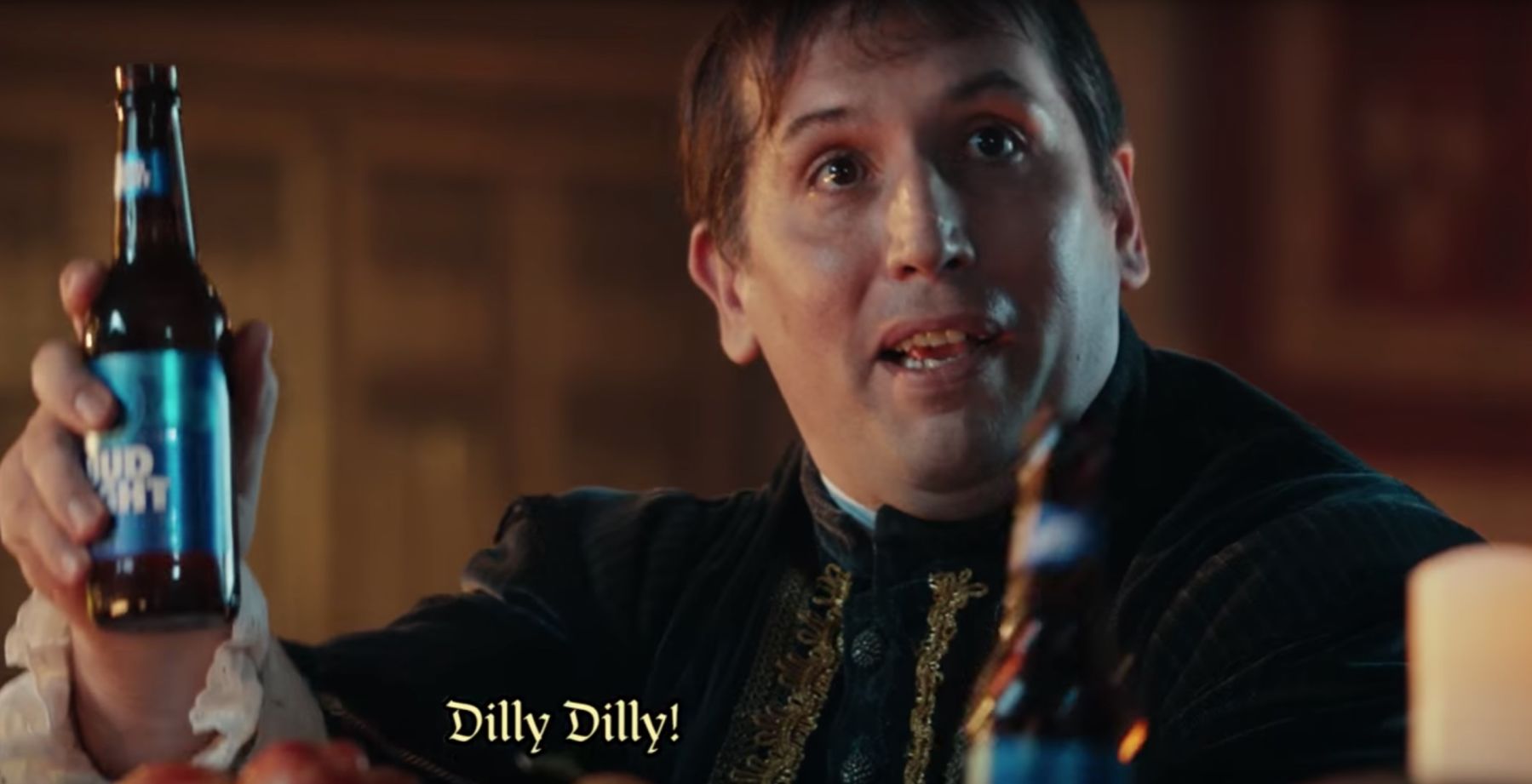It all began as a simple story of friendship, but it became one of the year’s biggest cultural moments as friends, fans, athletes, musicians and everyone’s dads all rallied around one celebratory medieval phrase...
Bud Light: Dilly Dilly
BeveragesNew YorkA cultural phenomenon starts with two simple words.
AgencyNew York
October 2017

The Origins
Our mission was to reinvigorate the Bud Light brand and make it a beer that people would be proud to hold again. To do that, we first had to put Bud Light back in the cultural conversation in a big, positive way.
In a time when we are beset by negativity and divided by our differences, beer drinkers were ready for something to bring us together. And if that thing was a medieval-era gibberish toast? All the better.
Thus, the Dilly Dilly phenomenon was born.
It started with a simple commercial that showed a king and queen at a banquet. The plot centered around a simple truth: when you bring Bud Light to a party, it’s for everyone, but when you bring a craft beer, it’s only for yourself. True friends are celebrated, while bad friends suffer the king’s justice and are banished to the Pit of Misery. Either way, everyone offers cheers with a hearty “Dilly Dilly!”

Those two words formed the basis of a multi-platform campaign that audiences made their own with countless tweets, comments, stories, Google searches, debates, Christmas Day sermons, hot takes, hashtags, bootleg apparel, ill-conceived tattoos and highway signs.
And when things really started to take off, we doubled down, creating a larger medieval world featuring wizards and oracles, rival armies and exotic lands, and one giant anthropomorphized beer can with a sword: the Bud Knight.
The Plan
We worked to get Bud Light in front of consumers during moments when they were sharing with their friends, in person and on social media. We used NFL football to seed the phrase Dilly Dilly and created additional fan-focused content for friends to use when talking about their teams.
Our medieval world was a big platform that was flexible enough to incorporate all manner of content and experiences, including films, product promotions, and cease and desist letters. The characters from this world showed up at the Super Bowl and even during the victory parade in Philadelphia.
We launched our first medieval film the Sunday that Game of Thrones aired its season finale. We provided fans with GIFs/memes they could use to comment on games. People ran with them, and even went a few steps further, creating their own content, T-shirts, hats and costumes. To keep the conversation fresh, we added different Dilly Dilly stories during key events like Thanksgiving and Christmas.



The Audience Speaks
Dilly Dilly took on a life of its own. The cultural wave started with sports fans across the country and then began appearing in signs on pregame shows and in stadiums. A tweet from JJ Watt, coverage on ESPN’s SportsCenter, and an in-game audible call from Pittsburgh Steelers quarterback Ben Roethlisberger opened the floodgates, and soon, Dilly Dilly started to earn attention from the mainstream media and become a topic of conversation for millions. Media outlets from Bustle to the Today show to The New York Times talked about it. Dilly Dilly became the third-most popular autofill suggestion for Google searches of “What does…” Even the dictionary people at Merriam-Webster weighed in on their Twitter feed.

Then, a craft brewer infringed on our copyright by creating a Dilly Dilly IPA. Rather than suing, we sent them a friendly cease and desist letter via a medieval town crier who read it aloud at their headquarters and gave them two tickets to the Super Bowl. It was a gesture celebrated by law and craft brewer publications alike.
We also created an epic Dilly Dilly moment when Philadelphia went to the Super Bowl, when the city made our catchphrase their own by redubbing it Philly Philly. We showed up at their Championship parade and gave everyone in the city free Bud Light, while skywriting Philly Philly and Dilly Dilly over their celebration.
Even months after the football season ended, Dilly Dilly remained on the tip of everyone’s tongues. When the Masters banned our beloved phrase, we sent 500 green Dilly Dilly hats for people to wear at the tournament.
Dilly Dilly was everywhere, resulting in 395,000 mentions on social and over 900 million earned media impressions overall. We increased retweets of our content by 111% and earned 789 press stories and posts.
But most importantly, we created a moment as big as anything else on the cultural landscape, brought people something they liked talking about, and put Bud Light back where it belongs: shared among friends across the country.
Share on